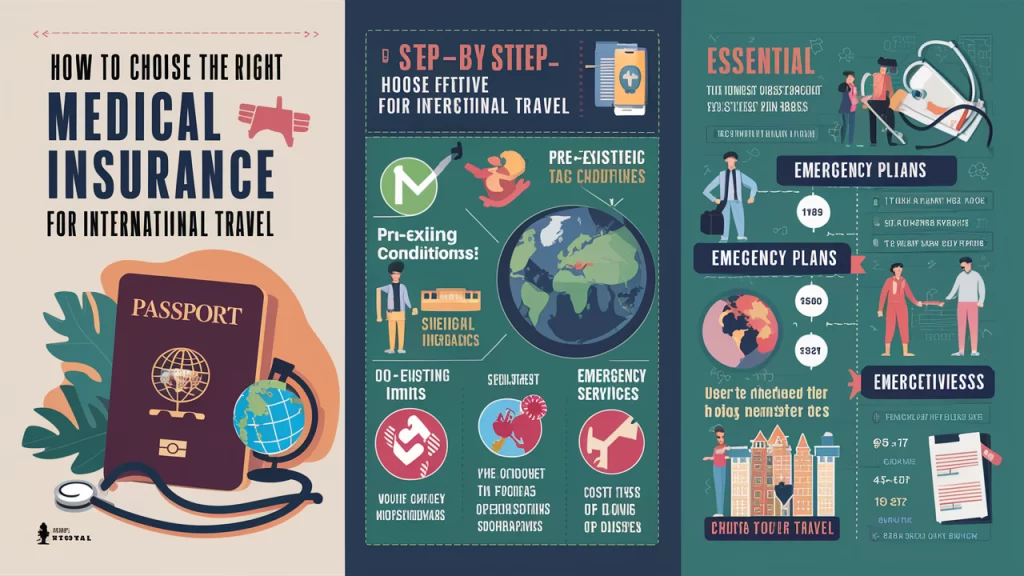Traveling internationally can be an exciting adventure, but it also comes with its share of risks, especially when it comes to health and medical emergencies. This is where having the right medical insurance for international travel becomes crucial. In this comprehensive guide, we’ll walk you through everything you need to know about choosing the right medical insurance for your international travels, including health insurance for travel and international health insurance for travel.

Content
Understanding the Basics of Medical Insurance
Medical insurance is designed to cover healthcare expenses, offering financial protection against the high costs of medical care. Key components of medical insurance include:
- Coverage: The range of medical services covered by the insurance.
- Premiums: Regular payments made to keep the insurance active.
- Deductibles: The amount you pay out-of-pocket before insurance kicks in.
- Co-pays: Fixed fees paid at the time of service.
Why You Need Medical Insurance for International Travel
Traveling without medical insurance can be risky. Unexpected illnesses, accidents, or medical emergencies abroad can result in significant financial burdens. Many travelers mistakenly believe their domestic health insurance covers them internationally, which often isn’t the case. Having travel-specific medical insurance ensures you have access to necessary medical services without hefty costs. For those interested in additional support, the post office travel insurance phone number can be a useful resource for further assistance.
Assessing Your Health Needs
Before choosing a policy, consider your health status. Evaluate personal health conditions, such as chronic illnesses or ongoing treatments, and how they might affect your travel. Age and the nature of your destination (urban vs. remote areas) can also influence your insurance needs.
Types of Medical Insurance for International Travelers
There are several types of medical insurance policies available for international travelers:
- Travel Medical Insurance: Short-term coverage for emergencies and medical expenses.
- International Health Insurance: Long-term coverage for expatriates or long-term travelers.
- Expatriate Health Insurance: Comprehensive coverage for those living abroad for extended periods.
Coverage Options to Consider
When selecting a policy, consider the following coverage options:
- Emergency Medical Coverage: Essential for sudden illnesses or accidents.
- Medical Evacuation and Repatriation: Covers the cost of transporting you to a suitable medical facility or back home.
- Coverage for Pre-Existing Conditions: Important for those with ongoing health issues.
- Adventure Sports and High-Risk Activities: Necessary if you plan to engage in activities like skiing, diving, or hiking.
Comparing Policies: What to Look For
When comparing insurance policies, pay attention to:
- Policy Limits and Exclusions: Maximum coverage limits and what’s not covered.
- Network of Healthcare Providers: Availability of healthcare providers in your travel destination.
- Claims Process and Customer Support: The ease of filing claims and the quality of customer service.
Evaluating Insurance Providers
Choose a provider with a strong reputation and financial stability. Look for reviews and ratings from other travelers, and consider additional services or perks offered, such as 24/7 assistance hotlines. Having access to the post office travel insurance phone number can provide added peace of mind if you require immediate assistance.
Understanding the Costs
Understand the costs involved, including premiums, deductibles, and any potential out-of-pocket expenses. It’s essential to balance the cost with the level of coverage provided to ensure you’re adequately protected without overspending.
Checking the Fine Print
Always read the policy documents carefully. Understand the terms and conditions, especially the exclusions and limitations, to avoid surprises when you need to use the insurance.

How to Purchase Medical Insurance
You can buy medical insurance online or through an agent. When purchasing, you’ll need to provide information such as travel dates, destinations, and personal health details. Ensure you have all necessary documents ready. The post office travel insurance phone number can also assist with inquiries related to policy details and purchasing options.
Making a Claim
If you need medical assistance while abroad, know the steps for making a claim:
- Seek Medical Attention: Visit a hospital or clinic as needed.
- Notify Your Insurance Provider: Contact your insurer as soon as possible.
- Gather Documentation: Keep all medical reports, receipts, and other relevant documents.
Tips for Using Your Insurance Effectively
- Keep a Copy of Your Policy and Emergency Contacts: Have these accessible at all times.
- Know the Local Healthcare System: Familiarize yourself with local healthcare facilities and emergency numbers.
Special Considerations for Different Traveler Types
Different travelers have unique needs:
- Students: May need coverage for longer stays or specific health risks.
- Retirees: Often require more comprehensive coverage for age-related conditions.
- Families: Look for policies that cover all family members.
- Business Travelers: Consider coverage for frequent travel and specific business risks.
Conclusion
Choosing the right medical insurance for international travel is crucial for ensuring peace of mind and financial protection. By assessing your needs, understanding the types of coverage available, and carefully selecting a provider, you can enjoy your travels with confidence. Always read the fine print and make sure your policy aligns with your travel plans and health requirements. Whether it’s health insurance for travel or international health insurance for travel, being well-prepared makes all the difference.

An avid traveler, Kirk Grover has been to over 50 countries. He has an extensive background in tourism and hospitality management, along with a degree in Hospitality Management from the University of Nevada Las Vegas. Kirk is very knowledgeable about travel-related topics – they are always up to date on the latest deals for flights, hotels, and other adventures around the world.











